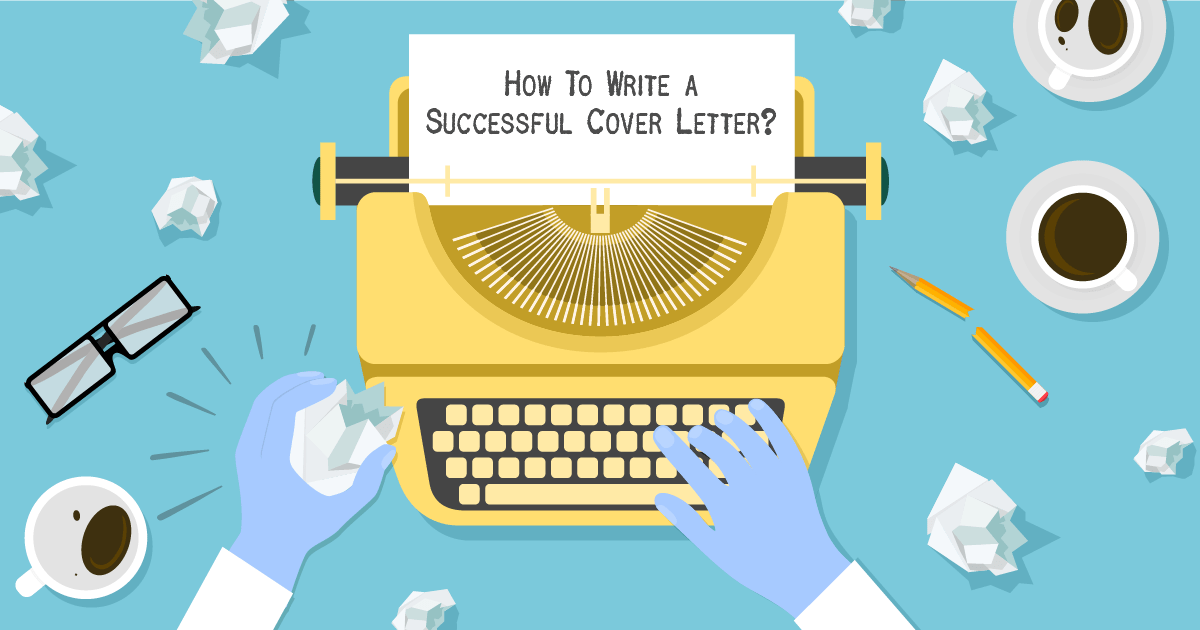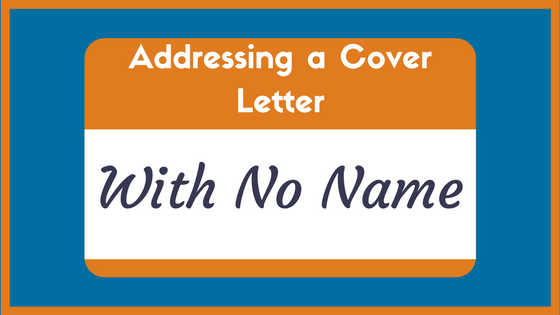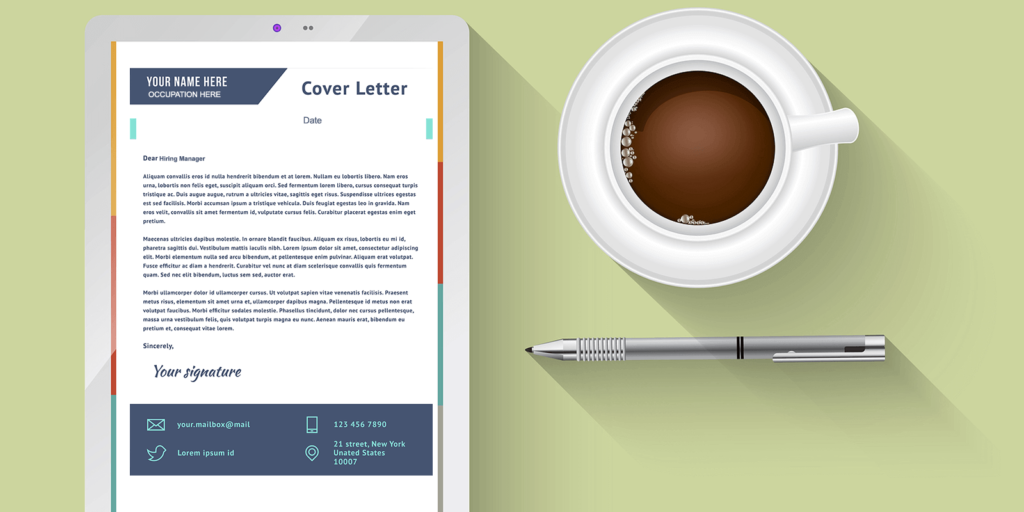A cover letter is a one-page document you submit as part of your job application (alongside your CV or Resume). Its purpose is to introduce you and briefly summarize your professional background. Your cover letter should average be 250 to 400 words long. A good cover letter can spark the HR manager’s interest and get them to read your resume.
Cover letters add context to your CV and allow you to sell your skills and experience to potential employers.
A bad cover letter, on the other hand, might mean that your application is going directly to the paper shredder. So, to make sure this doesn’t happen, it’s essential to know how to write a convincing cover letter. Keep in mind, though, that a cover letter is a supplement to your resume, not a replacement. Meaning you don’t just repeat whatever is mentioned in your resume.
Know the difference between a resume and a CV.

Types of Cover Letters

Application Cover Letter
This is the most common type of cover letter used to apply for a job. This traditional style includes details about your professional experience as it relates to the requirements of the job post.
Referral Cover Letter
A referral cover letter is also used when applying for a job but mentions the name of a current employee who referred you to the open position. A referral can help you stand out during the hiring process. Hiring through the referral process is often easier, less expensive, and more effective than using job sites for employers.
Letter of Interest
A letter of interest is a cover letter to inquire about job openings at a company you want to work at. A company may not have job postings but may still be looking for qualified individuals. This type of cover letter takes the initiative to let the hiring manager know your interest in working with them.
Value Proposition Letter
A value proposition letter is a summary that explains what makes you unique, such as your skills, accomplishments, and the value you can add to a company. This short cover letter is usually used as a resume summary statement or as an answer for "tell me about yourself" style interview questions.
Importance of a Cover Letter in a Job Search
A cover letter is a document sent alongside your CV when applying for jobs. It acts as a personal introduction and helps to sell your application. A cover letter is necessary as it allows you to explain to an employer why you're the best candidate for the job. You do this by highlighting relevant skills and experience; therefore, you should always write your cover letter with the position you're applying for in mind.
Check out the best job sites for freshers in India.
Not to be confused with personal statements for your CV, cover letters should complement your CV but not duplicate it. The general consensus among recruiters regarding the length of these documents is that the shorter, the better. Typically three to five short paragraphs, cover letters should not exceed one A4 page.
The purpose of a cover letter is to introduce you as a candidate without summarising your entire career. A cover letter is more personal than a resume/CV, as it allows you to show your enthusiasm for the job and the company. And that’s why it shouldn’t be generic. You must show how your qualifications and personal traits match a certain job description and company culture.
First of all, a lot of people aren't writing cover letters. Many applicants skip this step altogether, whether they're too lazy, don't want to bother, or think cover letters are a waste of time. This means you already have an advantage just by drafting one.
You're already ahead of the game if you submit a cover letter, even if it's not a great cover letter. This will show potential employers that you're willing to go above and beyond and make a serious effort to reach your goals.
Beyond that, cover letters can show hiring managers who you are beyond the statistics on your resume or LinkedIn. Are you personable, funny, serious, and dedicated? Show that through your writing. Don't be afraid to type how you talk (within the bounds of professionalism).
If a hiring manager can get more of a feel for who you are, they're more likely to advance you than the person who is merely a collection of talking points and numbers. They can also easily tell whether you'd fit into the company culture. When it comes to the content of the cover letter, this is where it can be beneficial.
Where your resume will list basic responsibilities and tasks that you took on at your job, your cover letter is a place where you can share a project you worked on, a problem you solved, or relate your experiences directly to the job's responsibilities to which you're applying.

Find complete job search help in this comprehensive guide for freshers in India.
Tips for Cover Letters for Indian Students
Before writing your cover letter it's important that you do your research. While reading the job description thoroughly is essential, it's often not enough. To help you craft a successful cover letter discover more about:
- who will be reading your cover letter
- the organization and its culture
- the industry it operates in and any relevant news
- company competitors and market position.
- the organization's goals over the next five years.
When writing your cover letter, keep it brief while making sure it emphasizes your suitability for the job. It can be broken down into the following sections:
- First paragraph - The opening statement should explain why you're writing the letter. Begin by stating the position you're applying for, where you saw it advertised and when you are available to start.
- Second paragraph - Highlight relevant experience and demonstrate how your skills match the specific requirements of the job description. Summarise any additional strengths and explain how these could benefit the company.
- Third paragraph - Cover why you're suitable for the job, what attracted you to this type of work, why you're interested in working for the company, and what you can offer the organization. This is a good opportunity to show off your knowledge of the company.
- Last paragraph - Use the closing paragraph to round up your letter. Reiterate your interest in the role and indicate your desire for a personal interview. Now is the time to mention any unavailable dates.
Once finished, read through the document and cut out unnecessary words and sentences. Don't fill up space by repeating what's already covered in your CV. As a general rule, only mention your current salary or salary expectations if the employer has specifically asked you to do so in the job description. If you're asked to include this information put it between the third and last paragraphs.
Unless the job advert states differently (for example, it may ask you to provide your CV and cover letter as a Word document), save it with a .PDF file extension to ensure it can be opened and read on any machine. Windows PCs and Macs don't always work in harmony - Windows use a .docx file extension and Macs .pages, but if the recruiter uses the opposite system, they may be unable to open your file. Using a .PDF file extension should solve this.
Check out the best formats for a fresher resume.

Addressing a Cover Letter
Always try and address your cover letter directly to the person who will be reading it. Remember that you're more likely to receive a reply if you send it to the right person. If you're struggling to find a named contact you can use a general greeting such as:
- Dear Sir/Madam
- Dear Hiring manager
- Dear Human resources director.
However, general greetings should only be used once you have exhausted methods of finding a named contact.
Signing Off
How you sign off your cover letter depends on how you address it. If you include a named contact, sign off 'Yours sincerely. If you use a general greeting, finish with 'Yours faithfully.'
Keep it Short
Most cover letters should remain under a page. The length will ultimately depend on the number of details you feel you must include and if the employer specifies a minimum or maximum length. Be as clear and concise as possible to illustrate your qualifications.
Check out the best cover letter format for freshers in India.
A cover letter is essential because it explains details on your resume in more depth and is the first impression a hiring manager has of you. Employers use cover letters to narrow down the applicant pool and choose the group of candidates they want to interview. While some jobs require a cover letter, others make it optional to see which applicants will put in the extra effort.
Résumer avec l'IA :











